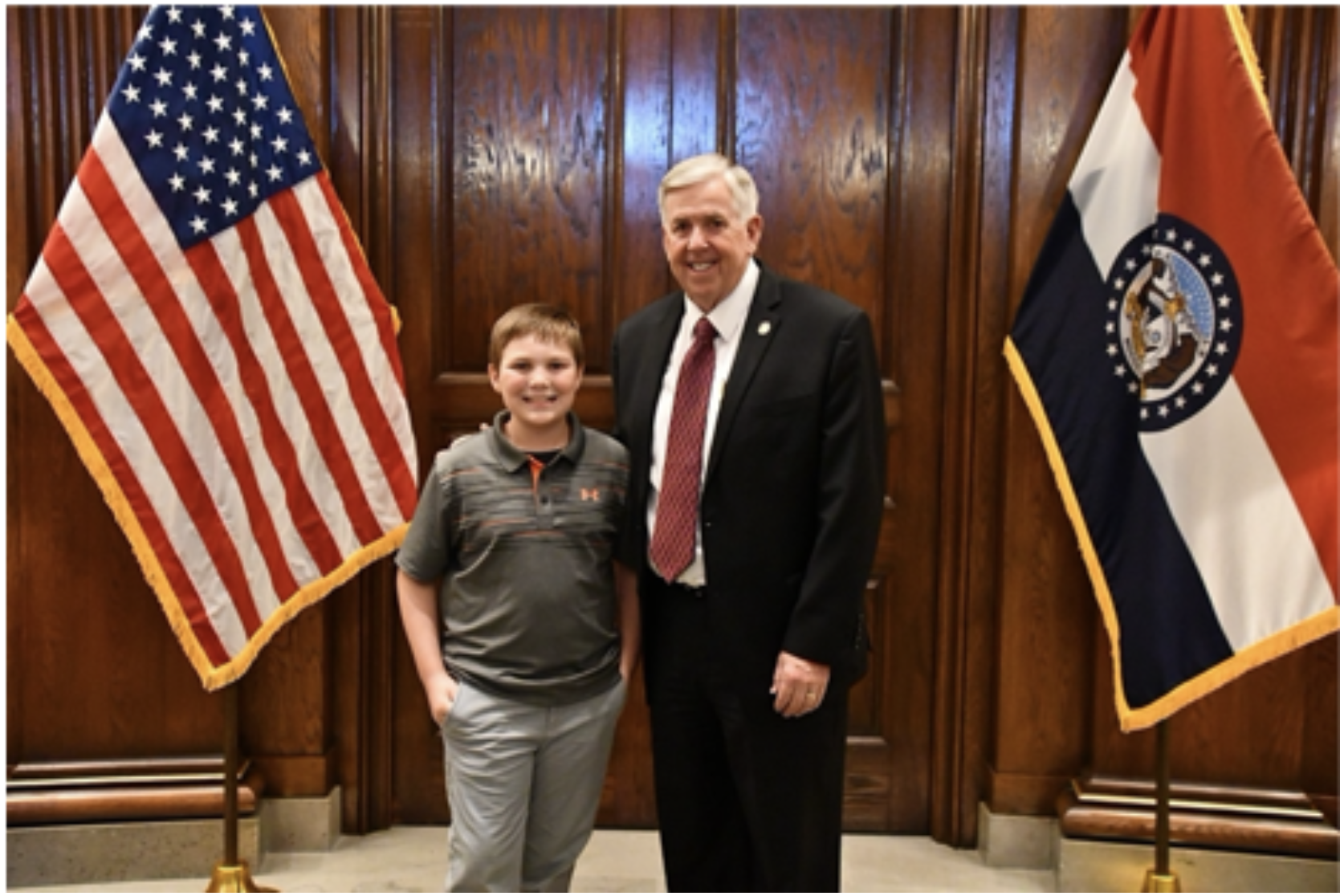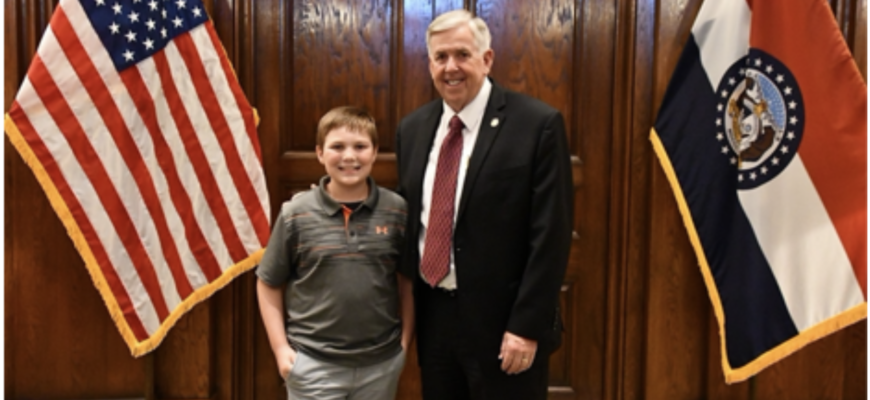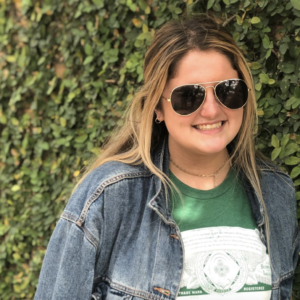Dyslexia St. Louis Learning & Advocacy Center is proud to have Maggie Harr be our guest blogger this month. Maggie and her son, Aiden, are strong, fierce advocates for people with dyslexia. We hope you enjoy her piece as much as we did.
In addition to all of her other amazing work, Maggie has started a FaceBook Support Page for parents, educators, and professionals. Check that out here: https://www.facebook.com/groups/582605278792986

Aiden meeting with Governor Parsons to discuss Missouri becoming a leader in teaching all kids to read.
Smart. This was the first word that people would use when they met my son Aiden. He was precocious and funny, assertive and confident, and yes, very “smart” had a love of nature and animals, regularly engaging in conversations about adaptations and habitat destruction that would leave adults at a loss for words. Aiden had a lot of questions about the world. There was so much wonder and eagerness to learn for a little guy. He was going to LOVE kindergarten!
Let me take a step back and share that I am a special education teacher. We are a literacy-rich household and my son loved books. Aiden was bright, healthy, and happy. I was going to wow the elementary teachers with this kindergarten-ready child. After all, I’ve trained my whole life for this.
Only, it didn’t quite happen that way.
I spent time weekly volunteering in Aiden’s kindergarten class. That is when I began noticing that despite his many strengths, he seemed to struggle more than his classmates. Sadly, he noticed that too.
We sprang into action and tirelessly worked on sight words. I remember him looking at the word “the” and tapping the side of his head using self-talk trying to jog his memory: “Oooohhhh- I know this. It’s a digraph, but which one is it?”
Yes, I had a 5-year-old that could look at letter clusters and call it a digraph, but couldn’t identify the word “the”.
I was honestly confused and thought, at times, he was acting out or trying to be silly. For example, when we would try to rhyme simple words, he would say things like “bat” rhymes with “bed” or “dog” rhymes with “kitten”. I noticed that he had to say the alphabet in his head to recognize and recall letters. He often confused letters writing them backward… even in his own name.
Yet, at the same time, he displayed incredible comprehension of the stories we read before bed. He sorted his home library into fiction and nonfiction categories. He capably explained to me why realistic fiction was tricky, distinguishing a third category. He had these fun moments of brilliance that demonstrated his understanding of complex concepts.
One day, I saw him crying at his desk and watched him explain to his teacher that it’s like he writes his own language. He has all of these big words in his head, but that no matter how hard he tried; he couldn’t get them on paper.
I was concerned but was reassured by his teacher that he was smart and would “catch up”. Honestly, this is exactly what I wanted, even needed to hear, so it was easy to believe.
Just keep reading and practicing sight words. I can do that! Check, check!
First grade- Aiden started to become very anxious and sad. Meltdowns became a part of our daily routine. What should have been simple homework assignments ended up taking all evening. He worked so hard, but something wasn’t connecting for him. I asked his teacher if the school reading interventionist could take a look at him. My request was granted, and Aiden was added to a small group for direct instruction a few times a week.
Okay, now he will catch up quickly. Early intervention for the win. Right?
Unfortunately, not for Aiden. However, it was the only option available for additional support and was used for over a year with little progress. The lesson that I would understand much further into our journey was that not all intervention programs are proven to be successful in children with Dyslexia.
Looking back, I remember subtle comments that the Reading Specialist made at second-semester conferences that I didn’t pick up on at the time. For instance, Aiden struggled with the directionality of reading books, and he would seem to know words one day and then not the next. I was asked if we were reading and practicing at home. We were working incredibly hard at home! I remember being so defensive of that question that it made it difficult to take in the details of her concerns or share mine.
At this point, I started to question whether my child had a severe deficit, and perhaps I was expecting too much out of him. If the specialists couldn’t help him, then what were my options? Was literacy attainable? It’s actually painful to admit that in a way I started to lose hope that my child would ever experience academic success.
Oh and over summer, keep reading and practicing sight words.
Second grade- Aiden’s teacher began noticing the dramatic difference in my son’s verbal answers and his ability to read and write. At some point in our back and forth conversations, Dyslexia was mentioned. Of course, I went to the internet and discovered a warning sign chart from the International Dyslexia Association. As I read through 13 characteristics, I noted that my son exhibited 11of them.
I immediately requested testing. One of the first things that needed to take place was an eye exam. I sat in the waiting room hoping that a pair of glasses would be my silver bullet fix.
Unfortunately, what I was met with is something I’m embarrassed to retell. However, I understand the significance of this moment.
The ophthalmologist asked me if Aiden knew his letters. After a long pause, I struggled to explain he is in second grade… I mean, he’s behind in reading, but he’s reading small books. He has an interventionist and is a leveled reader. Of course, he knows his letters! The doctor decided to switch the test to pictures rather than use letters to complete the exam. Shortly after, I was handed a paper explaining that his eyesight was perfect.
Aiden couldn’t recognize his letters without an alphabet or word wall or a picture to cue him. At that moment, I realized the coping my child had been doing for years. Aiden memorized. He memorized where cheat charts were in the classroom, his homework folder, and on his desk. He remembered flashcards by a fold in the paper or smudge on the front, and he guessed. He was consistently inconsistent. At nearly 8 years old, Aiden could not recognize letters out of the context of his learning environment. They were symbols of a code he couldn’t crack.
I’m a teacher. I’m his mother. How did I not know?
While going through the school process for testing, I began the kind of research that every concerned mother understands- the kind where you wake up early, go to bed late, and dream about it. I put in phone calls to every doctor, educational psychologist, tutor, program, and school professional that I could find. The system is so incredibly difficult to navigate and when you do, you discover not only the expense and dead ends, but you are never completely sure if you are doing enough or doing it right.
Finally, I had someone call me back, and with a minor meltdown of my own, the appointment was moved up several months. Thankfully, our outside testing consisted of university doctors and their students who worked extensively with Aiden, gaining the much-needed insights into his strengths and details of every struggle. I was told that he was incredibly bright. He was also profoundly dyslexic. This diagnosis came with what seemed to be a book of recommendations or for this mom, it was relief- a map to understanding how I could finally help my child.
That car ride home from our evaluation meeting began the open conversation about what Dyslexia is and how he learns differently. Aiden wiped away a tear and asked, “you mean my brain isn’t broken?” “No buddy. Far from it. You are bright and capable. Now we will start teaching you in the ways you learn.”
I have an immense amount of grace and appreciation for our public education teachers. I am one. None of this was covered in college. Despite my education and training, I had trouble helping my son. Aiden’s teachers and I, are all learning together. Educators that have worked with Aiden have now identified concerns with countless other students, some even with their own children.
Aiden did meet eligibility for a Specific Learning Disability using the discrepancy model, which was bittersweet, knowing he would begin receiving the help he needed, but it also came with a reminder of how much he struggles every day. In three years’ time, he has had three special education teachers, all with different training and backgrounds, which has made the consistency of service difficult for everyone. With that said, he has truly had the most loving, patient and understanding teachers. We developed beginning-of-the-year routines to set him up for success, such as holding a team meeting and emailing staff an introductory video of Aiden discussing his learning needs and interests.
Access to assistive technology has been extremely important to Aiden since the second grade. Audiobooks are his favorite. His classroom teacher implemented this accommodation before we even had a diagnosis of Dyslexia. Instead of only reading low-level books, or “baby books” as he would call them, Aiden was able to “ear read” and soak up the adventures of Percy Jackson. He carried around the best books just like his buddies and has fueled his love of reading despite his challenges.
The biggest change we’ve seen since discovering Dyslexia is in Aiden’s social-emotional well-being. He has taken pride in becoming an advocate for himself and the 1 in 5 kids like him. He has put together informational library displays for Dyslexia Awareness Month, and has given multiple presentations about Dyslexia and assistive technology in front of his class, educators, and parents. Working with Decoding Dyslexia Missouri, Aiden shared his story with the Missouri House of Representatives, Senate, and most recently Governor Parsons to gain support for a Reading Success Bill. Even a local news station covered his advocacy efforts highlighting his speech to the local Board of Education asking for early identification of struggling readers, teacher training, and evidenced-based remediation. Really, he openly discusses Dyslexia with anyone who will listen; in fact, he is patiently waiting on a call from The Ellen Show.
Aiden is now 11 and beginning sixth grade at a school for high-potential kids with learning differences. This was a difficult decision as he loved his local elementary school, but no amount of accommodations are a replacement for effective instruction. Our school system and teachers need time to catch up. As his story is still being written, our hope is that he gains the needed skills to successfully return to his public high school. As for me, well, I sit behind him recording, taking pictures, and crying. This child has discovered the strength of his voice and is using it to help other children building himself up in the process. He realizes that there is so much hope in owning his story… working to improve a broken system.
To the parents at the beginning or in a difficult spot in your journey, you are not alone. There are lots of parent and professional support groups online. Find your tribe. Trust your instincts, as you are the best advocate for your child. Celebrate your child’s strengths and take every opportunity to create successful moments. And please, share your story, as there are many that will come after you.
For the educators in the trenches of an ever-changing and demanding system, you are not alone. Your efforts are appreciated. We need your expertise and concern as part of our team. You make a difference, and we will work to get you the support and training you need to help all kids learn to read. When in doubt, be patient and kind- this doesn’t cost a thing and means the world to a struggling child.
Aiden Advocacy Video- 5th Grade
Meeting the Governor

About the Author:
Maggie Harr M.S.ED. in Adult and Higher Education
Special Education Teacher, Registered Nurse, MPACT Parent Mentor, Public Education/Dyslexia Advocate, and mother to a child with Dyslexia




